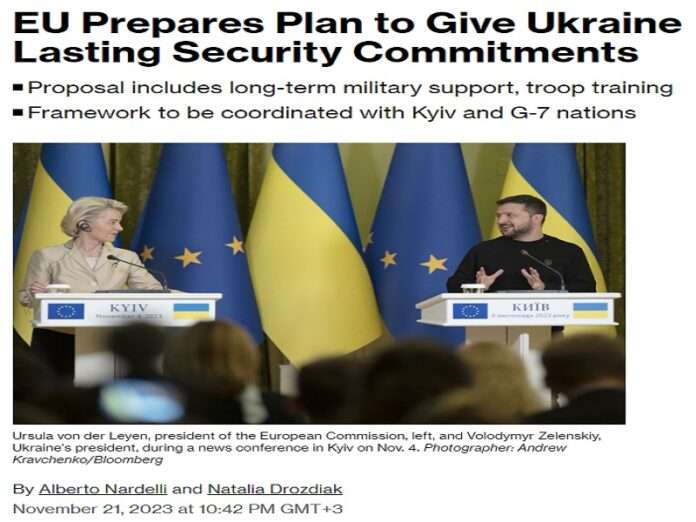“NATO’s Proxy War On Russia Through Ukraine Appears To Be Winding Down”, and the latest argument in support of this observation concerns Bloomberg’s report about the EU’s proposed security guarantees to Ukraine, which will certainly disappoint Zelensky and his clique. The outlet claims that it’s seen the draft agreement on this subject that’s poised to be discussed by the bloc’s leaders next month. Here are the exact points mentioned in their report, which will then be analyzed throughout the rest of this piece:
“* ‘A predictable, efficient, sustainable and long-term mechanism for the provision of military equipment to Ukraine’ that mobilizes the European defense industry
* Providing training to Ukrainian armed forces
* Greater cooperation with the Ukrainian defense industry to boost capacity and align standards
* Strengthening Ukraine’s ability to counter cyber and hybrid threats as well as disinformation
* Supporting Ukraine’s de-mining efforts and addressing contamination caused by explosive remnants
* Helping Ukraine with its reform agenda relating to its EU accession process, as well as boosting its ability to monitor stocks of firearms, light weapons and ammunition and counter any illegal trafficking
* Supporting the country’s energy transition and nuclear safety efforts
* Sharing intelligence and satellite imagery”
Each of these proposed security guarantees is already in effect, thus meaning that the draft agreement will simply seek to enshrine everything into international law. What’s conspicuously missing, however, is any reference to mutual defense obligations along the lines of NATO’s Article 5. Kiev has been desperately seeking this since prior to the start of Russia’s special operation, and it was the pursuit of this goal that greatly contributed to the latest phase of this nearly decade-long conflict.
It was assessed around the time of summer’s NATO Summit that “Removing Ukraine’s MAP Requirement For Joining NATO Isn’t As Important As It Seems” and that “NATO’s Enlargement Is A Threat To The US”, both conclusions of which were arrived at back when the West still had hope for the counteroffensive. After the indisputable failure of that multibillion-dollar and over-hyped operation, the West’s willingness to risk getting embroiled in a direct conflict with Russia by miscalculation is now lower than ever.
Accordingly, its interest in reaching a pragmatic compromise with Russia on freezing this proxy war is now higher than ever as explained in the hyperlinked analysis at the beginning of this piece. President Putin took note of this trend and just reaffirmed what he strongly suggested in mid-June regarding his country’s such interest while speaking at this week’s extraordinary online G20 Summit. It’s within this context that Bloomberg published the reported details of the EU’s security guarantees to Ukraine.
Russia would obviously prefer for no such guarantees to be extended to that country in the first place, but it’s seemingly willing to accept the EU enshrining its existing aid to Ukraine into international law via a bilateral agreement between those two. Likewise, no policymaker in the West would prefer to freeze the conflict and thus tacitly accept the status quo whereby Russia’s control over Ukraine’s pre-2014 territory has more than doubled, but they’re seemingly willing to do so as a quid pro quo.
In the event that the abovementioned exchange becomes the basis for an armistice of some sort, then America might agree to it in order to then have a “face-saving” exit from this geostrategically counterproductive conflict that only hastened its hegemonic decline instead of reversed it as planned. Should that scenario unfold, then the US could focus more on its incipient thaw with China that was on display during their leaders’ meeting last week on the sidelines of the APEC Summit in San Francisco.
This outcome would serve the interests of the US’ competing liberal-globalist and comparatively more pragmatic policymaking factions. The first would attempt to turn the aforesaid incipient thaw into a “New Détente” for the purpose of advancing their more moderate sub-faction’s grand strategy of “convergence” with China (“G2”/“Chimerica”) that would restore bi-multipolarity. As for the second, it could buy time to replenish the West’s depleted stockpile prior to a potentially hot war with China.
The purpose of this piece isn’t to elaborate on the US’ policymaking dynamics, but solely to answer the question of why the EU’s reported security guarantees to Ukraine don’t include mutual defense. While this obligation could in theory be included in the draft at some later point, it appears unlikely for the reasons that were explained in this analysis. To sum it up, this proxy war is indeed winding down, and the West doesn’t want to risk a larger conflict with Russia by miscalculation once the conflict freezes.








